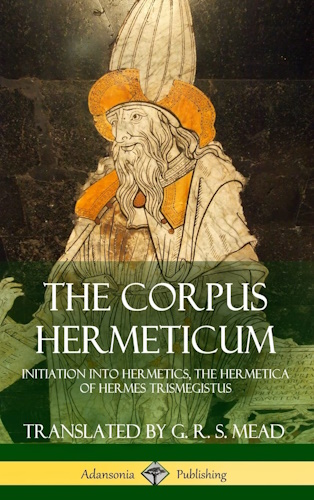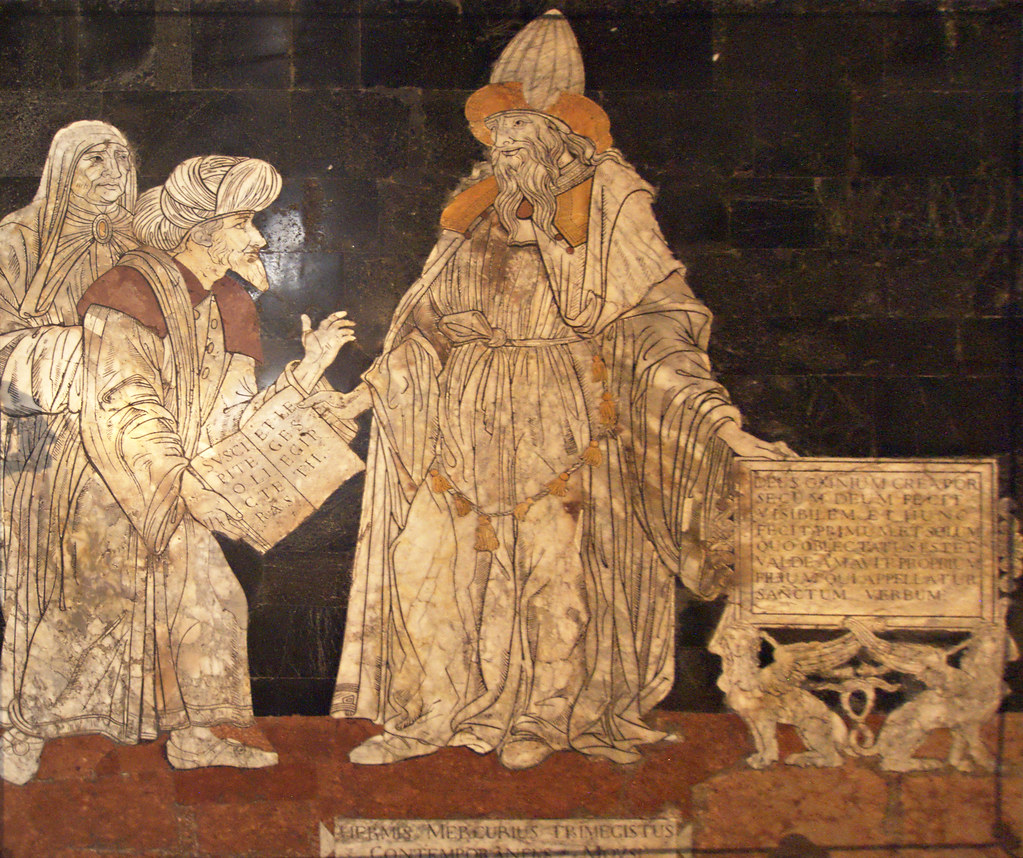
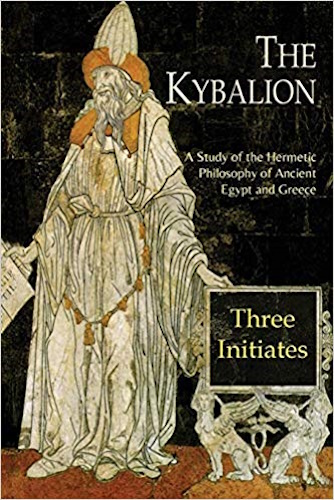

![Thrice-Greatest Hermes; Studies in Hellenistic Theosophy and Gnosis [Three Volumes in One] Thrice-Greatest Hermes; Studies in Hellenistic Theosophy and Gnosis [Three Volumes in One]](http://realityroars.com/images/affiliate-creative/thrice-greatest-hermes--studies-in-hellenistic-theosophy-and-gnosis.jpg)

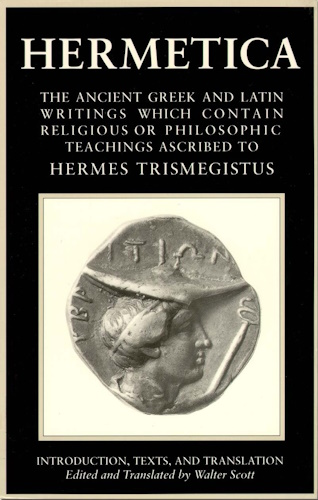



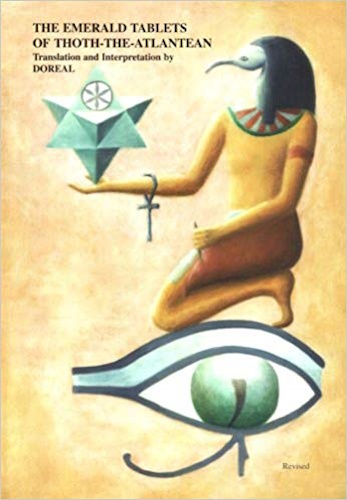

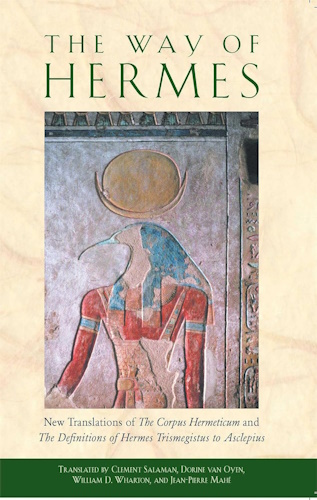

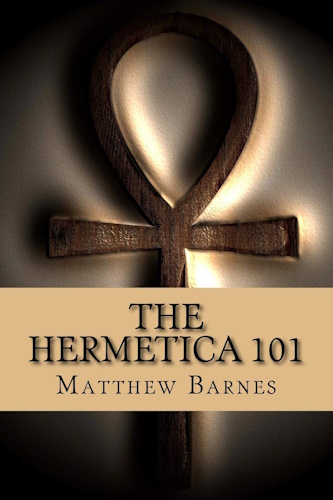

![]()
![]()
X. The Key
<This longer tractate presents itself explicitly as a summary or abridgement of the General Sermons (CH II-IX), and discusses the Hermetic view of knowledge and its role in the lives and afterlives of human beings. The attentive reader will notice certain contradictions between the afterlife-teachings of this and previous tractates.
One of the central concepts of The Key, and of Hermetic thought generally, is the distinction between ordinary discursive knowledge which can be expressed in words (in Greek, episteme, which Mead translates somewhat clumsily as "science") and transcendent, unitive knowledge which cannot be communicated (in Greek, gnosis, which Mead simply and sensibly leaves untranslated). The same distinction can be found in many systems of mystical thought. Unlike most of these, though, the Hermetic teachings place value on both.
Readers without much experience in the jargon of Classical philosophy will want to remember that "hylic" means "material", "passible" means "subject to outside forces or to suffering", and "intelligible" means "belonging to the realm of the Mind", and "motion" includes all kinds of change. The special implications of "good" in Greek thought - of self-sufficiency and desirability - should also be kept in mind.
The delightful irony of the Zen moment early in section 9, when Hermes - in the middle of this very substantial lecture - defines the good and pious man as "he who doth not say much or lend his ear to much" and thus rules out both himself and his audience, seems to have been lost on subsequent commentators. - JMG>
1. Hermes: My yesterday's discourse (logos) I did devote to thee, Asclepius, and so 'tis [only] right I should devote toafy's to Tat; and this the more because 'tis the abridgement of the General Sermons (Logoi) which he has had addressed to him.
"God, Father and the Good", then, Tat, hath the same nature, or more exactly, energy.
For nature is a predicate of growth, and used of things that change, both mobile and immobile, that is to say, both human and divine, each one of which He willeth into being.
But energy consists in something else, as we have shown in treating of the rest, both things divine and human things; which thing we ought to have in mind when treating of the Good.
2. God's energy is then His Will; further His essence is to will the being of all things. For what is "God and Father and the Good" but the "to be" of all that are not yet? Nay, subsistence self of everything that is; this, then, is God, this Father, this the Good; to Him is added naught of all the rest.
And though the Cosmos, that is to say the Sun, is also sire himself to them that share in him; yet so far is he not the cause of good unto the lives, he is not even of their living.
So that e'en if he be a sire, he is entirely so by compulsion of the Good's Good-will, apart from which nor being nor becoming could e'er be.
3. Again, the parent is the children's cause, both on the father's and the mother's side, only by sharing in the Good's desire [that doth pour] through the Sun. It is the Good which doeth the creating.
And such a power can be possessed by no one else than Him alone who taketh naught, but wills all things to be; I will not, Tat, say "makes".
For that the maker is defective for long periods (in which he sometimes makes, and sometimes doth not make) both in the quality and in the quantity [of what he makes]; in that he sometimes maketh them so many and such like, and sometimes the reverse.
But "God and Father and the Good" is [cause] for all to be. So are at least these things for those who can see.
4. For It doth will to be, and It is both Itself and most of all by reason of Itself. Indeed, all other things beside are just bacause of It; for the distinctive feature of the Good is "that it should be known". Such is the Good, O Tat.
Tat: Thou hast, O father, filled us so full of this so good and fairest sight, that thereby my mind's eye hath now become for me almost a thing to worship.
For that the vision of the Good doth not, like the sun's beam, firelike blaze on the eyes and make them close; nay, on the contrary, it shineth forth and maketh to increase the seeing of the eye, as far as e'er a man hath the capacity to hold the inflow of the radiance that the mind alone can see.
Not only does it come more swiftly down to us, but it does us no harm, and is instinct with all immortal life.
5. They who are able to drink in a somewhat more than others of this Sight, ofttimes from out the body fall asleep in this fairest Spectacle, as was the case with Uranus and Cronus, our forebears. may this be out lot too, O father mine!
Hermes: Yea, may it be, my son! But as it is, we are not yet strung to the Vision, and not as yet have we the power our mind's eye to unfold and gaze upon the Beauty of the Good - Beauty that naught can e'er corrupt or any comprehend.
For only then wilt thou upon It gaze when thou canst say no word concerning It. For Gnosis of the Good is holy silence and a giving holiday to every sense.
6. For neither can he who perceiveth It, perceive aught else; nor he who gazeth on It, gaze on aught else; nor hear aught else, nor stir his body any way. Staying his body's every sense and every motion he stayeth still.
And shining then all round his mond, It shines through his whole soul, and draws it out of body, transforming all of him to essence.
For it is possible, my son, that a man's soul should be made like to God, e'en while it still is in a body, if it doth contemplate the Beauty of the Good.
7. Tat: Made like to God? What dost thou, father, mean?
Hermes: Of every soul apart are transformations, son.
Tat: What meanest thou? Apart?
Hermes: Didst thou not, in the General Sermons, hear that from one Soul - the All-soul - come all these souls which are made to revolve in all the cosmos, as though divided off?
Of these souls, then, it is that there are many changes, some to a happier lot and some to [just] the contrary of this.
Thus some that were creeping things change into things that in the water dwell, the souls of water things change to earth-dwellers, those that live on earth change to things with wings, and souls that live in air change to men, while human souls reach the first step of deathlessness changed into daimones.
And so they circle to the choir of the Inerrant Gods; for of the Gods there are two choirs, the one Inerrant, and the other Errant. And this is the most perfect glory of the soul.
8. But if a soul on entering the body of a man persisteth in its vice, it neither tasteth deathlessness nor shareth in the Good; but speeding back again it turns into the path that leads to creeping things. This is the sentence of the vicious soul.
And the soul's vice is ignorance. For that the soul who hath no knowledge of the things that are, or knowledge of their nature, or of Good, is blinded by the body's passions and tossed about.
This wretched soul, not knowing what she is, becomes the slave of bodies of strange form in sorry plight, bearing the body as a load; not as the ruler, but the ruled. This [ignorance] is the soul's vice.
9. But on the other hand the virtue of the soul is Gnosis. For he who knows, he good and pious is, and still while on the earth divine.
Tat: But who is such an one, O father mine?
Hermes: He who doth not say much or lend his ear to much. For he who spendeth time in arguing and hearing arguments, doth shadow-fight. For "God, the Father and the Good", is not to be obtained by speech or hearing.
And yet though this is so, there are in all the beings senses, in that they cannot without senses be.
But Gnosis is far different from sense. For sense is brought about by that which hath the mastery o'er us, while Gnosis is the end <i.e., goal> of science, and science is God's gift.
10. All science is incorporeal, the instrument it uses being the mind, just as the mind employs the body.
Both then come into bodies, [I mean] both things that are cognizable by mond alone and things material. For all things must consist out of antithesis and contrariety; and this can otherwise not be.
Tat: Who then is this material God of whom thou speakest?
Hermes: Cosmos is beautiful, but is not good - for that it is material and freely passible; and though it is the first of all things passible, yet is it in the second rank of being and wanting in itself.
And though it never hath itself its birth in time, but ever is, yet is its being in becoming, becoming for all time the genesis of qualities and quantities; for it is mobile and all material motion's genesis.
11. It is intelligible rest that moves material motion in this way, since Cosmos is a sphere - that is to say, a head. And naught of head above's material, as naught of feet below's intelligible, but all material.
And head itself is moved in a sphere-like way - that is to say, as head should move, is mind.
All then that are united to the "tissue" of this "head" (in which is soul) are in their nature free from death - just as when body hath been made in soul, are things that hath more soul than body.
Whereas those things which are at greater distance from this "tissue" - there, where are things which have a greater share of body than of soul - are by their nature subject unto death.
The whole, however, is a life; so that the universe consists of both the hylic and of the intelligible.
12. Again, the Cosmos is the first of living things, while man is second after it, though first of things subject to death.
Man hath the same ensouling power in him as all the rest of living things; yet is he not only not good, but even evil, for that he's subject unto death.
For though the Cosmos also is not good in that it suffers motion, it is not evil, in that it is not subject to death. But man, in that he's subject both to motion and to death, is evil.
13. Now then the principles of man are this-wise vehicled: mind in the reason (logos), the reason in the soul, soul in the spirit <or, rather, vital spirits>, and spirit in the body.
Spirit pervading [body] by means of veins and arteries and blood, bestows upon the living creature motion, and as it were doth bear it in a way.
For this cause some do think the soul is blood, in that they do mistake its nature, not knowing that [at death] it is iteh spirit that must first withdraw into the soul, whereon the blood congeals and veins and arteries are emptied, and then the living creature <or life> is withdrawn; and this is body's death.
14. Now from one Source all things depend; while Source [dependeth] from the One and Only [One]. Source is, moreover, moved to become Source again; whereas the One standeth perpetually and is not moved.
Three then are they: "God, the Father and the Good", Cosmos and man.
God doth contain Cosmos; Cosmos [containeth] man. Cosmos is e'er God's Son, man as it were Cosmos' child.
15. Not that, however, God ignoreth man; nay, right well doth He know him, and willeth to be known.
This is the sole salvation for a man - God's Gnosis. This is the Way Up to the Mount.
By Him alone the soul becometh good, not whiles is good, whiles evil, but [good] out of necessity.
Tat: What dost thou mean, Thrice-greatest one?
Hermes: Behold an infant's soul, my son, that is not yet cut off, because its body is still small and not as yet come unto its full bulk.
Tat: How?
Hermes: A thing of beauty altogether is [such a soul] to see, not yet befouled by body's passions, still all but hanging from the Cosmic Soul!
But when the body grows in bulk and draweth down the soul into its mass, then doth the soul cut off itself and bring upon itself forgetfulness, and no more shareth in the Beautiful and the Good. And this forgetfulness becometh vice.
16. It is the same for them who go out from the body.
For when the soul withdraws into itself, the spirit doth contract itself within the blood, and the soul within the spirit. And then the mind, stripped of its wrappings, and naturally divine, taking unto itself a fiery body, doth traverse every space, after abandoning the soul unto its judgement and whatever chastisement it hath deserved.
Tat: What dost thou, father, mean by this? The mind is parted from soul and soul from spirit? Whereas thou said'st the soul was the mind's vesture, and the soul's the spirit.
17. Hermes: The hearer, son, should think with him who speaks and breathe with him; nay, he should have a hearing subtler than the voice of him who speaks.
It is, son, in a body made of earth that this arrangement of the vestures comes to pass. For in a body made of earth it is impossible the mind should take its seat itself by its own self in nakedness.
For neither is it possible on the one hand the earthly body should contain so much immortality, nor on the other that so great a virtue should endure a body passible in such close contact with it. It taketh, then, the soul for as it were an envelope.
And soul itself, being too and thing divine, doth use the spirit as its envelope, while spirit doth pervade the living creature.
18. When then the mind doth free itself from the earth-body, it straightway putteth on its proper robe of fire, with which it could not dwell in an earth-body.
For earth doth not bear fire; for it is all set in a blaze even by a small spark. And for this cause is water poured around earth, to be a guard and wall, to keep the blazing of the fire away.
But mind, the swiftest thing of all divine outthinkings, and swifter than all elements, hath for its body fire.
For mind being builder doth use the fire as tool for the construction of all things - the Mind of all [for the construction] of all things, but that of man only for things on earth.
Stript of its fire the mind on earth cannot make things divine, for it is human in its dispensation.
19. The soul in man, however - not every soul, but one that pious is - is a daimonic something and divine.
And such a soul when from the body freed, if it have fought the fight of piety - the fight of piety is to know God and to do wrong to no man - such a soul becomes entirely mind.
Whereas the impious soul remains in its own essence, chastised by its own self, and seeking for an earthly body where to enter, if only it be human.
For that no other body can contain a human soul; nor is it right that any human soul should fall into the body of a thing that doth possess no reason. For that the law of God is this: to guard the human soul from such tremendous outrage.
20. Tat: How father, then, is a man's soul chastised?
Hermes: What greater chastisement of any human soul can there be, son, than lack of piety? What fire has so fierce a flame as lack of piety? What ravenous beast so mauls the body as lack of piety the very soul?
Dost thou not see what hosts of ills the impious soul doth bear?
It shrieks and screams: I burn; I am ablaze; I know not what to cry or do; ah, wretched me, I am devoured by all the ills that compass me about; alack, poor me, I neither see nor hear!
Such are the cries wrung from a soul chastised; not, as the many think, and thou, son, dost suppose, that a [man's] soul, passing from body, is changed into a beast.
Such is a very grave mistake, for that the way a soul doth suffer chastisement is this:
21. When mind becomes a daimon, the law requires that it should take a fiery body to execute the services of God; and entering in the soul most impious it scourgeth it with whips made of its sins.
And then the impious soul, scourged with its sins, is plunged in murders, outrage, blasphemy, in violence of all kinds, and all the other things whereby mankind is wronged.
But on the pious soul the mind doth mount and guide it to the Gnosis' Light. And such a soul doth never tire in songs of praise [to God] and pouring blessing on all men, and doing good in word and deed to all, in imitation of its Sire.
22. Wherefore, my son, thou shouldst give praise to God and pray that thou mayst have thy mind Good Mind. It is, then, to a better state the soul doth pass; it cannot to a worse.
Further there is an intercourse of souls; those of the gods have intercourse with those of men, and those of men with souls of creatures which possess no reason.
The higher, further, have in charge the lower; the gods look after men, men after animals irrational, while God hath charge of all; for He is higher than them all and all are less than He.
Cosmos is subject, then, to God, man to the Cosmos, and irrationals to man. But God is o'er them all, and God contains them all.
God's rays, to use a figure, are His energies; the Cosmos's are natures, the arts and sciences are man's.
The energies act through the Cosmos, thence through the nature-rays of Cosmos upon man; the nature-rays [act] through the elements, man [acteth] through the sciences and arts.
23. This is the dispensation of the universe, depending from the nature of the One, pervading [all things] through the Mind, than which is naught diviner nor of greater energy; and naught a greater means for the atoning men to gods and gods to men.
He, [Mind,] is the Good Daimon. Blessed the soul that is most filled with Him, and wretched is the soul that's empty of the Mind.
Tat: Father, what dost thou mean, again?
Hermes: Dost think then, son, that every soul hath the Good [Mind]? For 'tis of Him we speak, not of the mind in service of which we were just speaking, the mind sent down for [the soul's] chastisement.
24. For soul without the mind "can neither speak nor act". For oftentimes the mind doth leave the soul, and at that time the soul neither sees nor understands, but is just like a thing that hath no reason. Such is the power of mind.
Yet doth it not endure a sluggish soul, but leaveth such a soul tied to the body and bound tight down by it. Such soul, my son, doth not have Mind; and therefore such an one should not be called a man. For that man is a thing-of-life <or animal> divine; man is not measured with the rest of lives of things upon the earth, but with the lives above in heaven, who are called gods.
Nay more, if we must boldly speak the truth, the true "man" is e'en higher than the gods, or at the [very] least the gods and men are very whit in power each with the other equal.
25. For no one of the gods in heaven shall come down to the earth, o'er-stepping heaven's limit; whereas man doth mount up to heaven and measure it; he knows what things of it are high, what things are low, and learns precisely all things else besides. And greater thing than all; without e'en quitting earth, he doth ascend above. So vast a sweep doth he possess of ecstasy.
For this cause can a man dare say that man on earth is god subject to death, while god in heaven is man from death immune.
Wherefore the dispensation of all things is brought about by means of there, the twain - Cosmos and Man - but by the One.


![Thrice-Greatest Hermes; Studies in Hellenistic Theosophy and Gnosis [Three Volumes in One] Thrice-Greatest Hermes; Studies in Hellenistic Theosophy and Gnosis [Three Volumes in One]](http://realityroars.com/images/affiliate-creative/thrice-greatest-hermes--studies-in-hellenistic-theosophy-and-gnosis.jpg)











-
Urantia Book, 44:0.11 - The Celestial Artisans
Never in your long ascendancy will you lose the power to recognize your associates of former existences. Always, as you ascend inward in the scale of life, will you retain the ability to recognize and fraternize with the fellow beings of your previous and lower levels of experience. Each new translation or resurrection will add one more group of spirit beings to your vision range without in the least depriving you of the ability to recognize your friends and fellows of former estates.
-
Princess Bride 1987 Wallace Shawn (Vizzini) and Mandy Patinkin (Inigo Montoya)
Vizzini: HE DIDN'T FALL? INCONCEIVABLE.
Inigo Montoya: You keep using that word. I do not think it means what you think it means. -
Urantia Book, 117:4.14 - The Finite God
And here is mystery: The more closely man approaches God through love, the greater the reality -- actuality -- of that man. The more man withdraws from God, the more nearly he approaches nonreality -- cessation of existence. When man consecrates his will to the doing of the Father's will, when man gives God all that he has, then does God make that man more than he is.
-
Urantia Book, 167:7.4 - The Talk About Angels
"And do you not remember that I said to you once before that, if you had your spiritual eyes anointed, you would then see the heavens opened and behold the angels of God ascending and descending? It is by the ministry of the angels that one world may be kept in touch with other worlds, for have I not repeatedly told you that I have other sheep not of this fold?"
-
Urantia Book, Foreword - 0:12.12 - The Trinities
But we know that there dwells within the human mind a fragment of God, and that there sojourns with the human soul the Spirit of Truth; and we further know that these spirit forces conspire to enable material man to grasp the reality of spiritual values and to comprehend the philosophy of universe meanings. But even more certainly we know that these spirits of the Divine Presence are able to assist man in the spiritual appropriation of all truth contributory to the enhancement of the ever-progressing reality of personal religious experience—God-consciousness.
-
Urantia Book, 1:4.3 - The Mystery Of God
When you are through down here, when your course has been run in temporary form on earth, when your trial trip in the flesh is finished, when the dust that composes the mortal tabernacle "returns to the earth whence it came"; then, it is revealed, the indwelling "Spirit shall return to God who gave it." There sojourns within each moral being of this planet a fragment of God, a part and parcel of divinity. It is not yet yours by right of possession, but it is designedly intended to be one with you if you survive the mortal existence.
-
Urantia Book, 1:4.1 - The Mystery Of God
And the greatest of all the unfathomable mysteries of God is the phenomenon of the divine indwelling of mortal minds. The manner in which the Universal Father sojourns with the creatures of time is the most profound of all universe mysteries; the divine presence in the mind of man is the mystery of mysteries.
-
Urantia Book, 1:4.6 - The Mystery Of God
To every spirit being and to every mortal creature in every sphere and on every world of the universe of universes, the Universal Father reveals all of his gracious and divine self that can be discerned or comprehended by such spirit beings and by such mortal creatures. God is no respecter of persons, either spiritual or material. The divine presence which any child of the universe enjoys at any given moment is limited only by the capacity of such a creature to receive and to discern the spirit actualities of the supermaterial world.
-
Urantia Book, 11:0.1 - The Eternal Isle Of Paradise
Paradise is the eternal center of the universe of universes and the abiding place of the Universal Father, the Eternal Son, the Infinite Spirit, and their divine co-ordinates and associates. This central Isle is the most gigantic organized body of cosmic reality in all the master universe. Paradise is a material sphere as well as a spiritual abode. All of the intelligent creation of the Universal Father is domiciled on material abodes; hence must the absolute controlling center also be material, literal. And again it should be reiterated that spirit things and spiritual beings are real.
-
Urantia Book, 50:6.4 - Planetary Culture
Culture presupposes quality of mind; culture cannot be enhanced unless mind is elevated. Superior intellect will seek a noble culture and find some way to attain such a goal. Inferior minds will spurn the highest culture even when presented to them ready-made.
-
Urantia Book, 54:1.6 - True And False Liberty
True liberty is the associate of genuine self-respect; false liberty is the consort of self-admiration. True liberty is the fruit of self-control; false liberty, the assumption of self-assertion. Self-control leads to altruistic service; self-admiration tends towards the exploitation of others for the selfish aggrandizement of such a mistaken individual as is willing to sacrifice righteous attainment for the sake of possessing unjust power over his fellow beings.
-
Urantia Book, 54:1.9 - True And False Liberty
How dare the self-willed creature encroach upon the rights of his fellows in the name of personal liberty when the Supreme Rulers of the universe stand back in merciful respect for these prerogatives of will and potentials of personality! No being, in the exercise of his supposed personal liberty, has a right to deprive any other being of those privileges of existence conferred by the Creators and duly respected by all their loyal associates, subordinates, and subjects.
-
Urantia Book, 54:1.8 - True And False Liberty
There is no error greater than that species of self-deception which leads intelligent beings to crave the exercise of power over other beings for the purpose of depriving these persons of their natural liberties. The golden rule of human fairness cries out against all such fraud, unfairness, selfishness, and unrighteousness.

